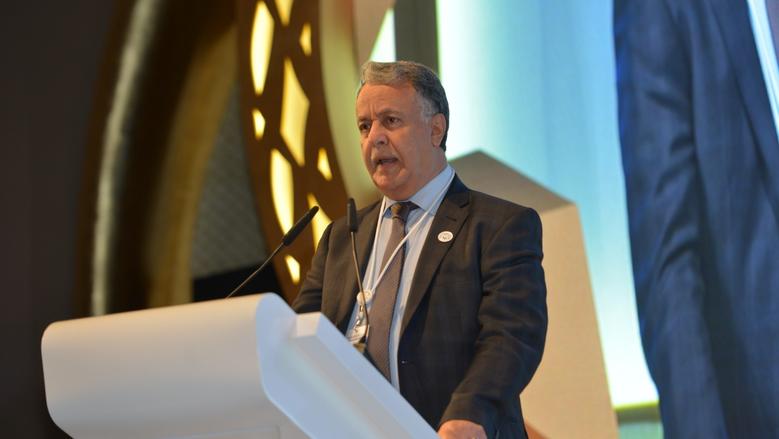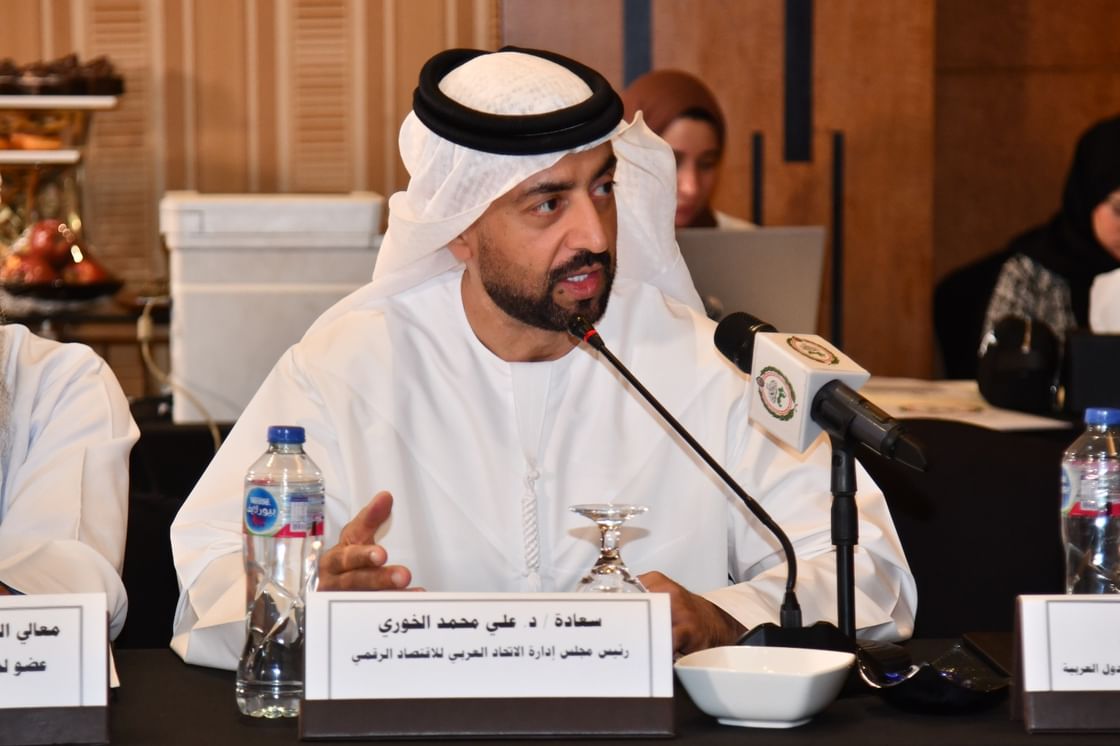Abu Dhabi
Wednesday, December 19, 2018
The first Arab Digital Economy Conference issued 12 recommendations at the conclusion of its proceedings, calling for the creation of a favorable legislative environment and revealing that such cooperation “through the digital economy” could contribute more than $3 trillion to Arab GDP growth.
The conference emphasized the importance of adopting a vision for Arab countries’ GDP growth opportunities that is directly proportional to population growth in the Arab region and the goals of improving the economic and social conditions of our Arab peoples.
At the conclusion of the sessions, the organizing committee announced the recommendations and the conference’s final statement, which began with the League of Arab States’ thanks to Sheikh Mohammed bin Zayed Al Nahyan, Crown Prince of Abu Dhabi and Deputy Supreme Commander of the UAE Armed Forces, for his support and sponsorship of the common Arab vision for the digital economy.
It also thanked Lieutenant General Saif bin Zayed Al Nahyan, Deputy Prime Minister and Minister of Interior, for his continued efforts in supporting such Arab initiatives and for opening the conference.
The organizing committee stated that choosing the Arab digital economy as the central issue of the joint Arab vision reflects the extent of awareness of the magnitude of the challenges facing the Arab region, given the pivotal role of modern technology in developing societies and economies in general.
In addition, investing in the digital economy is the way to enhance social, economic, and political stability in Arab countries.
The committee then presented the recommendations issued by the conference, including the potential for the digital economy to contribute more than $3 trillion to the growth of the Arab GDP. Therefore, the importance of adopting an Arab digital economy vision for the growth opportunities of Arab countries’ GDP is directly proportional to population growth in the Arab region and to the goals of improving the economic and social conditions of Arab peoples.
Currently, the digital contribution to the economies of Arab countries does not exceed 4%, compared to 22% globally.
In its closing statement, delivered by Ambassador Mohammed Mohammed Al-Rabee’, Secretary-General of the Council of Arab Economic Unity at the League of Arab States, the conference emphasized the importance of establishing laws and legislation regulating the digital economy and policies that govern technological progress and digital transformation to ensure inclusion of all Arab countries. It also emphasized the need to formulate flexible policies related to the components of the Arab digital economy, including technological infrastructure, related policies and legislation, governance, digital skills, financing, and inter- and global capital.
The first recommendation emphasized the potential contribution of the digital economy to the growth of the Arab GDP by more than $3 trillion. Therefore, the importance of adopting an Arab digital economy vision for the growth opportunities of Arab countries’ GDP is directly linked to population growth in the Arab region and to the goals of improving the economic and social conditions of our Arab peoples. Currently, the digital contribution to the economies of Arab countries does not exceed 4%, compared to 22% globally.
The recommendations emphasized the need to establish laws and legislation regulating the digital economy and policies that regulate technological progress and digital transformation to ensure inclusion of all Arab countries.
She pointed out the need to formulate flexible policies related to the components of the Arab digital economy, including technological infrastructure, related policies and legislation, governance, digital skills, financing, and inter- and global capital. She noted the focus on the main axes of the strategy, namely digital infrastructure, digital innovation, digital governments, digital trade, and digital citizens, to ensure the achievement of the 17 global sustainable development goals in various fields and sectors. The recommendations included harnessing all efforts to ensure a strong start to the shared Arab vision for the digital economy by identifying which countries to start from and the mechanism for quickly transferring and sharing successful models between Arab countries.
In addition to facilitating the rapid and flexible amendment of relevant laws to keep pace with the rapid developments in this field, the goal is to build a common Arab information system accessible to all member states. This includes launching awareness and training programs to enhance the capabilities of citizens in the Arab region to engage with advanced digital technologies and promote innovation and interaction. The organization emphasized coordination with relevant authorities to restructure education and learning in the Arab region and globally to better adapt to new future jobs that support the concept of the Arab digital economy. It indicated that success in building a common Arab digital economy requires a unified Arab financial system. Arab countries must upgrade and standardize their banking systems and ensure financial transparency as one of the globally required solutions to advance the digital economy.
It emphasized the need to create an environment where all forms of digital information are available to everyone, both individuals and institutions, both public and private, at an appropriate cost, enabling everyone to access digital economy outlets, which will reflect the desired well-being of Arab societies.
The conference included the need to make every effort to encourage the private sector to invest in the sustainable development of the digital economy, by encouraging it through the use of concessional financing, investment guarantees, appropriate investments, and improving the political and regulatory environment for private sector resources.
The final recommendation was to consolidate the success of joint Arab action in building a globally competitive digital economy through integration among Arab countries and the concerted efforts of Arab governments to achieve this goal.
Al-Rabee emphasized that continuous and constructive evaluation of the process of rebuilding public institutions and their legal systems is ongoing to advance the roles of all Arab countries in all areas of digital economy work.
The conference was held under the patronage of His Highness Sheikh Mohammed bin Zayed Al Nahyan, Crown Prince of Abu Dhabi and Deputy Supreme Commander of the Armed Forces, in Abu Dhabi, with distinguished Arab, regional, and international participation.
A recorded speech was broadcast during the conference by Christopher Ferguson, Director of National and International Research, on government digital services for the British Prime Minister’s Office. He shared some insights on the digital strategy and its importance for the future of the Arab region, emphasizing that the conference is the starting point for a new journey for the League of Arab States.
La Srivastava, Head of New Initiatives and Bridging the Standards Gap at the International Telecommunication Federation (ITU), spoke about the importance of leading the digital transformation from the summit, with the active participation of policymakers for the Arab digital economy, which will create significant economic and social benefits. The Finance session also highlighted the financial and banking issues of the digital economy and financial transparency, followed by a special session on digital transformation for sustainable development.










